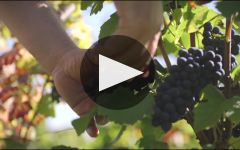Faiveley Corton Clos des Cortons Faiveley Grand Cru 2018
-
James
Suckling -
Jasper
Morris - Decanter
-
Robert
Parker



Product Details
Your Rating
Somm Note
Winemaker Notes
Ruby red in color with clear purple reflections. The nose is powerful, concentrated and exudes notes of black cherry and spice. The palate is rich and smooth with good energy and concentration. The finish is elegant. An excellent wine for cellar ageing. Serve with Seared foie gras with Armagnac, game, quail, full-flavored cheeses such as Cîteaux or Reblochon.
Professional Ratings
-
James Suckling
Wow. This is a solid Corton with ripe strawberries, plums, bark and porcini. Full-bodied with tight, fine tannins, focused depth of fruit and excellent length. Quite muscular for the vintage. Better after 2023.
-
Jasper Morris
Monopole. Glowing mid purple. Rich, intense black-purple. The bouquet is as saturated as the colour. Beautifully heady yet seems perfectly poised. The new oak adds a sheen which the wealth of fruit can support. Something of everything on the nose here, even a faint green streak. Very fresh style which is typical of their vineyard. Lots of energy. Note this is tasted after the riper and more luscious Côte de Nuits wines.
Barrel Sample: 94-96 -
Decanter
The Clos des Cortons Faiveley near the top of the Corton et Rognet slope has been in the family since 1874. This site, just over three hectares, is essentially a northern continuation of Les Renardes. In 2018, the vineyard delivered a tightly wound and tannic wine with lots of dark fruit. For now, it is marked by the cask aging, but there are the firm tannins, rich body, and length to suggest this will age exceptionally well.
-
Robert Parker's Wine Advocate
The 2018 Corton Grand Cru Clos des Cortons Faiveley is showing nicely in bottle, mingling aromas of cassis and dark berry fruit with hints of baking chocolate, grilled meats, forest floor and sweet spices. Medium to full-bodied, rich and elegantly muscular, its ripe core of fruit structured by powdery tannins and lively acids, it's long and expansive. This is a deep, brooding Clos des Corton that will demand bottle age to realize all its potential. Rating: 93+
Other Vintages
2021-
James
Suckling -
Jasper
Morris -
Wine
Spectator
-
James
Suckling -
Wine
Spectator -
Robert
Parker
- Decanter
-
James
Suckling -
Wine
Spectator -
Robert
Parker
-
James
Suckling - Decanter
-
Wine
Spectator -
Robert
Parker -
Jasper
Morris
- Decanter
-
James
Suckling -
Robert
Parker
-
Wine
Spectator -
Wine
Enthusiast -
Robert
Parker -
Wine &
Spirits
-
James
Suckling -
Wine
Spectator
-
Robert
Parker -
Wine
Spectator
-
Wine
Spectator -
Robert
Parker -
Wine
Enthusiast
-
Wine &
Spirits -
Wine
Spectator






Founded in 1825, Bourgognes Faiveley has been handed down from father to son for over 175 years. As the sixth generation to take the reins, François Faiveley manages, with equal amounts passion and competence, the largest family domaine in Burgundy. Methodically reconstructing vineyards fractured by French inheritance laws, Bourgognes Faiveley today owns more appellations in their entirety (monopoles) than any other domaine in Burgundy.
"Faiveley’s wines are... supremely clean and elegant: definitive examples of Pinot Noir... above all they have richness and breed, the thumbprint of a master winemaker."
-Clive Coates M.W.
Côte d’Or, A Celebration of the Great Wines of Burgundy

Thin-skinned, finicky and temperamental, Pinot Noir is also one of the most rewarding grapes to grow and remains a labor of love for some of the greatest vignerons in Burgundy. Fairly adaptable but highly reflective of the environment in which it is grown, Pinot Noir prefers a cool climate and requires low yields to achieve high quality. Outside of France, outstanding examples come from in Oregon, California and throughout specific locations in wine-producing world. Somm Secret—André Tchelistcheff, California’s most influential post-Prohibition winemaker decidedly stayed away from the grape, claiming “God made Cabernet. The Devil made Pinot Noir.”

Prevailing over the charming village of Aloxe, the hill of Corton actually commands the entire appellation. Corton is the only Grand Cru for Pinot Noir in the entire Côte de Beaune. Its Grand Crus red wines can be described simply as “Corton” or Corton hyphenated with other names. These vineyards cover the southeast face of the hill of Corton where soils are rich in red chalk, clay and marl.
Dense and austere when young, the best Corton Pinot Noir will peak in complexity and flavor after about a decade, offering some of the best rewards in cellaring among Côte de Beaune reds. Pommard and Volnay offer similar potential.
The great whites of the village are made within Corton-Charlemagne, a cooler, narrow band of vineyards at the top of the hill that descends west towards the village of Pernand-Vergelesses. Here the thin and white stony soils produce Chardonnay of exceptional character, power and finesse. A minimum of five years in bottle is suggested but some can be amazing long after. Fully half of Aloxe-Corton is considered Grand Cru.
